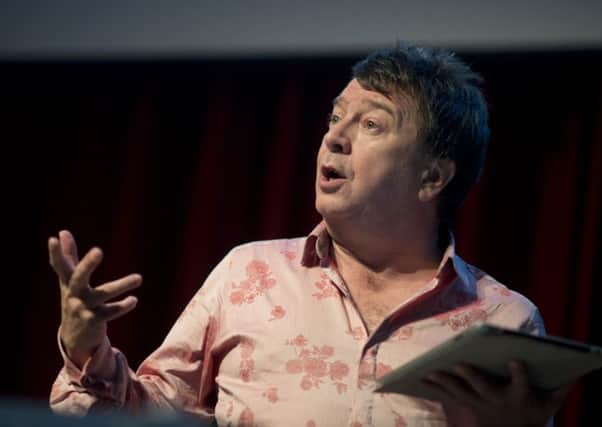Interview with the man who made Britpop


But he is also a writer of eminently readable works of non-fiction on music, society and culture, often inspired by his native north of England, from Cider with Roadies to The Pie at Night.
For his latest book, he has ditched the cosy, puntastic titles to reflect the serious (though Maconie hopes not solemn) subject matter. Long Road from Jarrow and its spin-off Fringe show Jarrow Road to the Deep South recount Maconie’s experiences and observations when he retraced the route of the Jarrow marchers last autumn to mark the 80th anniversary of the original Jarrow Crusade, when 200 men from the impoverished Tyneside town – and their MP “Red Ellen” Wilkinson - walked to Westminster in hopes of delivering an 11,000-signature petition to prime minister Stanley Baldwin appealing for jobs to be created in their area.
Advertisement
Hide AdAdvertisement
Hide Ad“That Jarrow March has become this romantic myth of working class culture,” says Maconie. “When I was a kid, my granny would talk about the Jarrow marchers and what heroes they were.”
However, Maconie was particularly struck by the similarities between the social and political landscape in 1936 and 2016. “Times were tough, a Conservative government had been re-elected with an increased majority, the Labour Party were seen as in disarray, the Labour leader as incompetent, we had this very fractious relationship with Europe, and there was the rise of what you might call strong man populism, so there were all these resonances.”
Of course, by the time Maconie embarked on his journey, the UK had voted to leave the European Union and his route took him through the Brexit heartlands, from neglected northern industrial towns to the less familiar (to him) byways of Middle England. “Walking through those towns I really got a sense of that feeling of abandonment,” he says. “They’d had the finger wagged at them and told that they were insular little Englanders, racists, because they weren’t sure what they thought about what was going on. And it turns out that insulting people is not a great way to get them on your side.”
Maconie’s own trip involved generally less fractious encounters and lots of helpful tips on how to take the temperature of the towns he was visiting, communicated to him via social media. But while that is one cultural phenomenon which was a long way off in 1936, Maconie describes the original Jarrow Crusaders as a media savvy bunch.
“They had two embedded journalists with them, they had a media committee, so they had a spin doctor, and what that meant in the end was they got loads of great press,” he says. “The BBC launched the week after the Jarrow march and has always had this crush on Jarrow, there’s been lots of documentaries, books and films about them.
“But I came away thinking, rather like the Jarrow men themselves, that the romantic myth outweighs the impact, because it changed absolutely nothing and the men admitted that. They said ‘next time we’ll go down with some bricks in our pockets’. The Jarrow marchers got nothing because they were supplicant, very polite and so terrified of being seen as communists.
“I don’t know if that’s a myth to be exploded but certainly I came to that melancholy conclusion. However, it’s supposed to be an entertaining show. It’s not going to be like the old Learning Zone on the Open University with me in a teardrop collared shirt and diagrams.”
Advertisement
Hide AdAdvertisement
Hide AdWhere the Jarrow marchers were turned away from the Houses of Parliament, and their petition ultimately lost to posterity, Maconie was determined to breach the Palace of Westminster in his genial but tenacious way. Strangely, he received no reply to his inquiring tweets from Theresa May, Jeremy Corbyn or Tim Farron, but Batley and Spen MP Tracy Brabin, elected to her seat following the murder of Jo Cox, came to the rescue and, only a few days into the job, acted as his guide.
Jarrow Road to the Deep South could well be the perfect vehicle for Maconie’s talents as a writer and communicator and his interests in British social and political history and pop culture which have been percolating since long before his first big break, writing for music weekly NME at a time when the music press could still be considered cultural gatekeepers. “Kids don’t need opinion formers anymore,” he says, “you just pick what songs you like.”
Maconie may no longer be naming music scenes but, earlier this year, he added a new accolade to his CV when he became the latest president of the Ramblers, in recognition of his love of walking and advocacy of the right to roam.
“I’m keen to change the perception of rambling as a nice middle class person in a Barbour jacket by a dry stone wall,” he says. “No one likes John Craven in a padded gilet more than me but I want to make the point that the outdoors is not just about agriculture.
“The Ramblers Society is rooted in industrial working class communities in the north of England and grew out of the 1932 Kinder Trespass where a bunch of young communists from Manchester and Derbyshire trespassed on private land in the Peak District and got sent to jail.
“I’m not advocating people being aggressive or violent but there’s lots of myths about Britain, that we’re a peaceful little country, eager to please.
“But from Boudicca to the Norman conquest to the Border Reivers to the English Civil War, we’ve always been quite a bolshy, argumentative nation with a long history of cutting the heads off kings and rioting.
Advertisement
Hide AdAdvertisement
Hide Ad“The idea that Britain’s natural state is calm and well-ordered is wrong. We’re not the Swiss, we’re a feisty nation and the Jarrow march is part of that tradition.”
• Stuart Maconie: Jarrow Road to the Deep South, Gilded Balloon at the Museum, 21-27 August at 7:30pm.